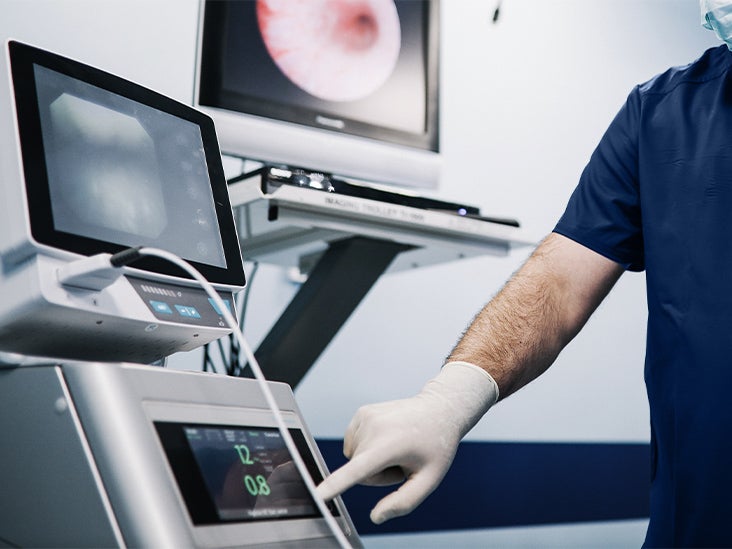
Two articles published today in the Annals of Internal Medicine journal examine the benefits and limitations of using artificial intelligence with colonoscopy procedures.
The results of these studies seem to contradict one another with one showing no diagnostic improvements and the other finding a reduction in the missed rate of colonoscopies.
“Overall, the two studies are different in design but come to contradictory conclusions regarding the use of
“One thing the two studies agree on is that detection of non-neoplastic findings (polyps that are not of worrisome histology) do increase with CADe,” Dr. Shaukat told Medical News Today.
Artificial intelligence (AI) is used extensively in medical sciences, according to a
“Artificial Intelligence is rapidly integrating into every aspect of our daily lives,” said Dr. James Lee, a gastroenterologist with Providence St. Joseph Hospital in Orange, CA, who was not involved in the studies.
“The role of AI in colonoscopy detection of colon polyps will be continually evaluated and advanced in coming years,” he told MNT. “Currently, the role of AI during the colonoscopy is to detect polyps on the screen by placing a green box (GI-Genius, Medtronic), attracting the endoscopist’s attention in real-time.”
There are some risks to colonoscopies, no matter which kind. These include having the doctor take extra tissue around the polyp and an increased risk of bleeding.
“In addition, the cost can increase by 15%,” Dr. Ashkan Farhadi, a gastroenterologist at MemorialCare Orange Coast Medical Center in California who was not involved in the studies, told MNT that costs can increase using this type of technology.
The first study did not find improved detection of premalignant or malignant lesions of colorectal cancer.
For this study, more than 3,000 people with a positive fecal immunochemical test (FIT) were randomly assigned to receive colonoscopies with or without (computer assistance) for the detection of advanced colorectal neoplasia, adenomas, serrated polyps, and non-polyploid and right-sided lesions.
The researchers said they chose people with positive tests because they have the highest prevalence of advanced colorectal neoplasias. Therefore, they provide the best context for investigating computer-aided detection and diagnosis of colorectal cancer.
Although the scientists observed a small effect, they did not find significant differences between the two groups in the detection rate of advanced colorectal neoplasias or in the average number of advanced colorectal neoplasias that were detected per colonoscopy.
They said the findings suggest additional research and more defined detection parameters in CAD before it can be integrated into routine care.
“The limitations of study one is that all participants had occult blood in their stool, and the study design was only to detect differences in advanced adenomas. The detection rate in the control group was 62 percent, and 64% CAD assisted colonoscopies. The baseline of 62 percent is very high when compared to regular screening colonoscopies this rate varies from 7 percent to 55 percent. This could be the reason why there was no difference between advanced adenomas.”
— Dr. James Lee, gastroenterologist
In the second study, researchers from Humanitas University conducted a systematic review and meta-analysis of 21 randomized trials with 18,232 participants on using CAD with a colonoscopy.
The researchers reported a higher detection rate of polyps but not for adenomas with a higher risk of cancer progression. They also found a 55% reduction in the miss rate when detecting adenomas.
However, they noted that the AI-assisted procedures could increase over-diagnosis and over-treatment of non-neoplastic polyps. They can also increase the amount of time to complete a colonoscopy.
“I think this study is more reliable because it pulled data from a large number of studies and a high number of participants were included,” Dr. Farhadi said.
The study mostly involved gastroenterology experts and researchers said it could be more helpful to less experienced doctors.
“Both studies showed similar findings that AI did not improve the detection of so-called advanced adenomas,” Dr. Lee said.
“Study two showed that the AI did increase overall detection and decreased the miss rate. Still, the harms of this study showed increased inspection time and increased number of polypectomies for non-neoplastic lesions.”
“The accuracy of a colonoscopy depends greatly on the operator,” Dr. Farhadi said. “Operators who typically find a low to medium number of polyps would benefit from using AI. Physicians who are highly skilled and performing colonoscopy probably won’t need AI.”
“I believe that AI is only as good as the endoscopist,” Dr. Lee said.
“If AI does not see the part of the colon (parts behind the fold of the colon because the endoscopist failed to expose that part of the colon), then AI has no idea that there are polyps there. Hopefully, in the future, if AI can notify endoscopists whether a part of the colon was not visualized or missed, then we probably have more complete assistance from the AI and more meaningful data.”
Whether using AI or not, experts say it is essential to ensure colonoscopies are accurate.
“I think it’s important to use AI for colonoscopies, Dr. Shaukat said, “but it is not essential if the endoscopist is doing other things to ensure a high quality exam.”
“With AI, one thing to watch is that it should not increase the non-neoplastic tissue removal, which adds cost and no benefit. Future enhancements of AI are awaited that can predict the histology of the polyp based on its surface, avoiding unnecessary tissue removal.”
— Dr. Aasma Shaukat, gastroenterologist
The studies did not answer the most crucial question, Dr. Lee noted. That is, will AI-assisted colonoscopy reduce colon cancer incidence and mortality?
He said additional prospective randomized clinical trials will be needed to answer these questions.
Share this article
OUR BRANDS
